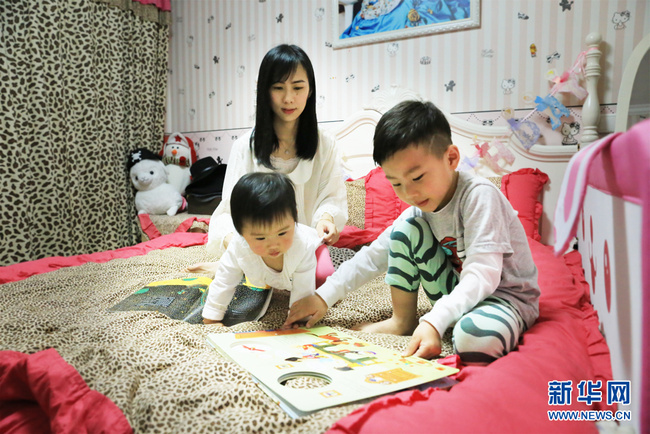

Northeast China's Liaoning Province is contemplating policies to offer benefits to couples who have a second child in a bid to encourage more births.
The provincial government will explore enacting policies to reward families who choose to have a second child to alleviate the burden in bearing and raising children, according to a guideline released late last month.
It said the government is also considering preferential policies in taxes, education, social welfare and housing for families who have a second child.

A mother of two children tells a bedtime story to her children in Shanghai, China, May 4, 2016. [File photo: Xinhua]
The planned policies are designed to raise the birth rate as the province tackles a dwindling workforce and an aging population.
The population of Liaoning reached 43 million in 2015, up 4.78 percent from 2000, but the provincial government believes that it will be increasingly difficult to maintain optimal population growth.
According to a 2015 survey, only 7.75 percent of parents with one child in Shenyang, the provincial capital, said they would consider having a second child, compared with 62.65 percent who said they would not.
If China's population decreases, it will slow economic growth, reduce demographic dividends and increase the burden on the social welfare system, said He Yixiong, an economist with Dalian Ocean University.
Since 2016, all couples in China have been allowed to have two children, bringing to an end to 40 years of the single child family planning policy.
Despite the policy change, the country's birth rate dropped from 1,295 to 1,243 per 100,000 people in 2017, due to a reduced number of women of childbearing age and the waning inclination of younger women to have a baby, according to the National Bureau of Statistics.
 Fire brigade in Shanghai holds group wedding
Fire brigade in Shanghai holds group wedding Tourists enjoy ice sculptures in Datan Town, north China
Tourists enjoy ice sculptures in Datan Town, north China Sunset scenery of Dayan Pagoda in Xi'an
Sunset scenery of Dayan Pagoda in Xi'an Tourists have fun at scenic spot in Nanlong Town, NW China
Tourists have fun at scenic spot in Nanlong Town, NW China Harbin attracts tourists by making best use of ice in winter
Harbin attracts tourists by making best use of ice in winter In pics: FIS Alpine Ski Women's World Cup Slalom
In pics: FIS Alpine Ski Women's World Cup Slalom Black-necked cranes rest at reservoir in Lhunzhub County, Lhasa
Black-necked cranes rest at reservoir in Lhunzhub County, Lhasa China's FAST telescope will be available to foreign scientists in April
China's FAST telescope will be available to foreign scientists in April "She power" plays indispensable role in poverty alleviation
"She power" plays indispensable role in poverty alleviation Top 10 world news events of People's Daily in 2020
Top 10 world news events of People's Daily in 2020 Top 10 China news events of People's Daily in 2020
Top 10 China news events of People's Daily in 2020 Top 10 media buzzwords of 2020
Top 10 media buzzwords of 2020 Year-ender:10 major tourism stories of 2020
Year-ender:10 major tourism stories of 2020 No interference in Venezuelan issues
No interference in Venezuelan issues
 Biz prepares for trade spat
Biz prepares for trade spat
 Broadcasting Continent
Broadcasting Continent Australia wins Chinese CEOs as US loses
Australia wins Chinese CEOs as US loses